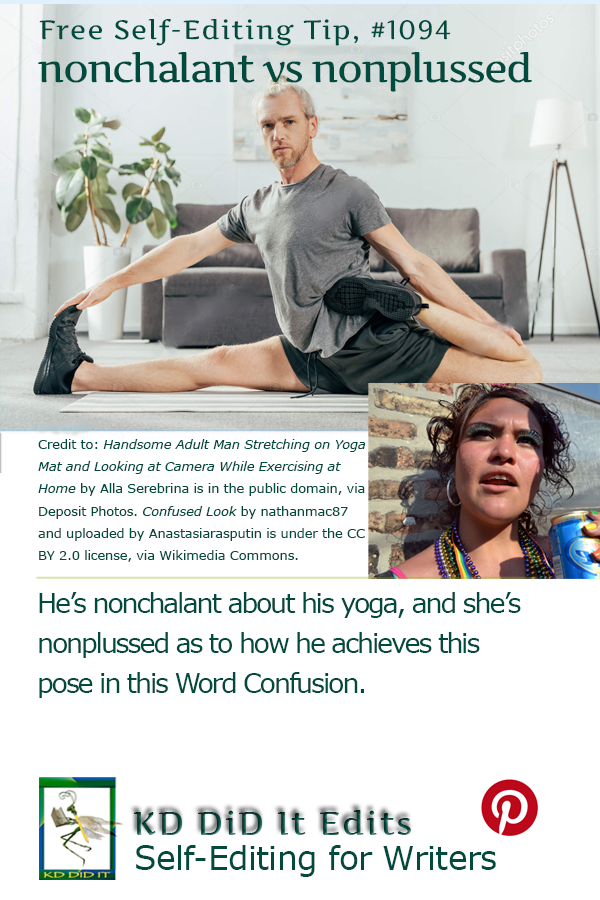Hmmm, despite his anxiety, he appeared nonplussed.
Look at nonplussed, which means confused, puzzled.
Contrast this with nonchalant, which means unexcited, relaxed, calm.
So, nonplussed in the example sentence means despite his anxiety, he appeared confused, puzzled. Why would a writer use despite and then contradict themselves?
If nonchalant were used instead, the sentence would read, despite his anxiety, he appeared calm, which makes a heckuva lot more sense.
Grammarians believe the word confusion between nonchalant vs nonplussed arose on the assumption that the non- in nonplussed was the normal negative prefix and must therefore have a negative meaning, resulting in nonplussed widely misused as a synonym for cool or unfazed, ahem, meaning nonchalant.
Word Confusions . . .
. . . started as my way of dealing with a professional frustration with properly spelled words that were out of context in manuscripts I was editing as well as books I was reviewing. It evolved into a sharing of information with y’all. I’m hoping you’ll share with us words that have been a bête noir for you from either end.
If you found this post on “Nonchalant versus Nonplussed” interesting, consider tweeting it to your friends. Subscribe to KD Did It, if you’d like to track this post for future updates.
| Nonchalant | Nonplussed |
|---|---|

Nonchalant by Michael Coghlan is under the CC BY-SA 2.0 license, via Flickr. |

Madeleine is Nonplussed by Dion Hinchcliffe is under the CC BY-SA 2.0 license, via Flickr. |
| Part of Grammar: | |
| Adjective | Adjective
Alternate spelling: nonplused |
[Of a person or manner] Feeling or appearing casually calm and relaxed
|
[Of a person] Surprised and confused so much that they are unsure how to react
[North American; informal; of a person] Not disconcerted
|
| Examples: | |
| She gave a nonchalant shrug.
His nonchalant manner infuriated me. He’d said it in such an offhand and nonchalant manner, though, that I decided to let it drop. He was very nonchalant, very offhand at the press conference when he was making those comments. |
He would be completely nonplussed and embarrassed at the idea.
I was somewhat nonplussed and ended up saying “I’m rather surprised they even felt the need to ask”. Felix is nonplussed by the pills, but others are less thrilled about the daily regime. But he remained nonplussed in the face of his wife’s cynicism. “No, thank you,” I replied, to all appearances nonplussed but inwardly raging. I hadn’t yet told my girlfriend I was leaving — I didn’t want to risk being crushed by a nonplussed response to the news. The hostility of the new neighbor’s refusal left Mrs. Walker nonplussed. |
| Derivatives: | |
| Adverb: nonchalantly Noun: nonchalance |
Noun: nonplus Verb: nonplussed |
| History of the Word: | |
| Mid-18th century, from the French, literally not being concerned, from the verb nonchaloir. | It was first recorded in 1600–10; nonplus + -ed. |
C’mon, get it out of your system, bitch, whine, moan . . . which words are your pet peeves? Also, please note that I try to be as accurate as I can, but mistakes happen or I miss something. Email me if you find errors, so I can fix them . . . and we’ll all benefit!
Satisfy your curiosity about other Word Confusions on its homepage or more generally explore the index of self-editing posts. You may also want to explore Book Layout & Formatting Ideas, Formatting Tips, Grammar Explanations, Linguistics, Publishing Tips, the Properly Punctuated, Writing Ideas and Resources, and Working Your Website.
Resources for Nonchalant versus Nonplussed
Apple Dictionary.com
Dictionary.com: nonchalant
Lexico.com: nonchalant, nonplussed
Pinterest Photo Credits:
Handsome Adult Man Stretching on Yoga Mat and Looking at Camera While Exercising at Home by Alla Serebrina is in the public domain, via Deposit Photos. Confused Look by nathanmac87 and uploaded by Anastasiarasputin is under the CC BY 2.0 license, via Wikimedia Commons.


